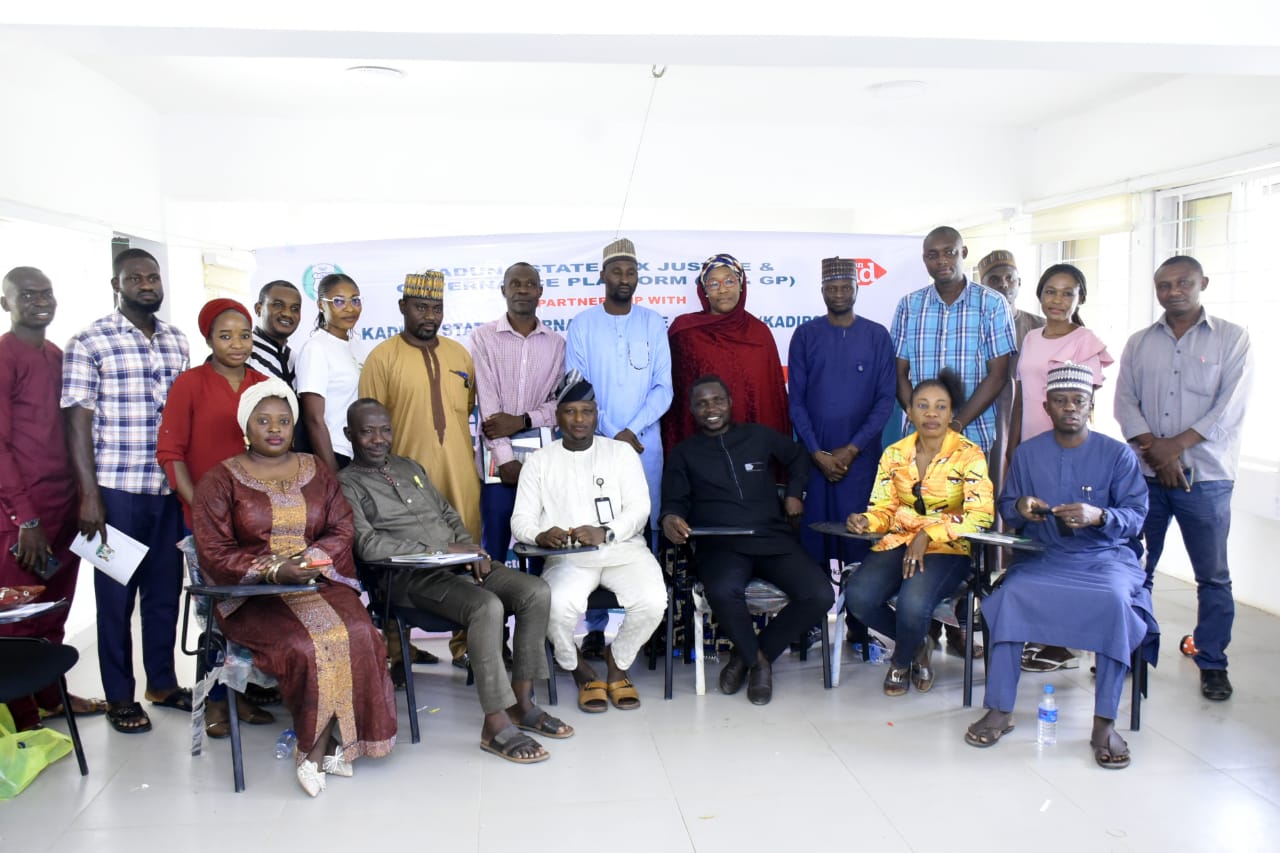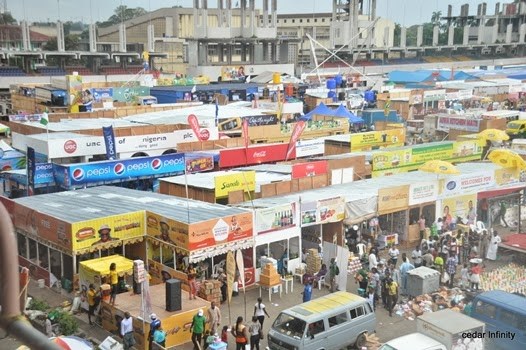Economy
Network, KADIRS Engage Media to Increase Visibility of IGR in Kaduna

Tax Justice Network (TJN), in partnership with the Kaduna State Internal Revenue Service (KADIRS), has engaged the media in ensuring possible ways of increasing visibility of Internally-Generated Revenue (IGR) through their reportage in Kaduna.
The round table engagement, which was aimed at enlistment of the support of media in Kaduna, was also supported by Christain aid.
The Coordinator of TJN in Kaduna, Mr Simeon Olatunde, described the media as a strategic partner whose contributions in promoting fair, inclusive and citizen driven tax process was paramount.
He noted that the TJN was a loose network of civil society and media advocate for equity and inclusive prosperity in Kaduna State.
It fosters social economic justice through equitable and fair tax system in the state and beyond.
“Over the years, we have been promoting good governance, tax education and awareness to protect and advance taxpayers’ rights and compliance collaboratively with the state government, private sector and development partners to improve and enhance the tax system that is inclusive and citizens driven,” he said.
According to Olatunde, the knowledge of tax is scanty among the media partners in Kaduna, which informed the round table engagement.
“The Network which has a loose coalition with tax concern, discovered that the media who was also part of the network and have very scanty knowledge of tax which sometimes revolves around figures and tax lines.
“Everything we are doing at the network with media is only at the micro level, not at a wider coverage,” he said.
He, therefore, said the engagement was to carry along other media, to expand the scope and educate, build their capacity to bring an end to the issues of tax education.
On educating public on tax administration, Olatunde said the network engaged communities through Community Development Charter (CDC) process to discuss concerns about tax at their community level.
The coordinator stressed the TJN’s committment in advocating development levy and tax for service, to ensure that specific amount of money was going back to the community.
Earlier, Mr Zakari Muhammad, KADIRS Head of Corporate Communication, said the specific objectives of the engagement was to increase the understanding and knowledge of media partners on IGR, and importance as a sustainable source of revenue generation.
He added that it was also to reawaken the media on their roles in empowering the residents to hold the government accountable.
Muhammad also said that the KADIRS was keen about receiving feedback, comments from stakeholders on achievements, challenges, and evidence in relation to the current state of IGR and its budget contribution in the media space.
He therefore emphasised the crucial role of media in reporting and advocating voluntary compliance in Kaduna state, while soliciting their support for a robust reportage of tax system, regime and other related issues within the tax space.
Also, A Media Resource Person, Mr Philip Yatai, said revenue generation, particularly IGR, was one of the key drivers of every development project.
He noted that the sole revenue earning for Nigeria which is the oil, is depleting globally and attached with many issues.
According to him, every developed country has its development tied to its IGR.
Yatai therefore said that the KADIRS had been working, including media engagement, which was not enough.
He, therefore, said the TJN worked in collaboration with the KADIRS to bring onboard the media to carry out sensitisation, advocacy and development journalism on tax administration with emphasis on tax justice and tax for service.
Yatai called on the government and civil society to always respond to the media calls and work with them as partners to achieve the common goal of service to humanity and communities through tax generation.
Earlier, The Acting Executive Chairman of KADIRS, Mr Jerry Adams, said the service was the sole authority mandated to collect and account for all taxes, levies, fees, charges and rates in the state as listed in the first schedule to the Law.
Adams, represented by the KADIRS Executive Director, Revenue Operations, Dr Muhammand Lawal, gave an overview of taxes and reforms since 2015 to date in Kaduna state.
He noted that a lot of transformation and structural reforms, which cut across manual to digitisation in tax administration, had seen improvement in KADIRS operations over the years.
According to him, the transformation over the year had increased the state IGR, which ranked the state among top five in the country on IGR.
Adams, therefore, urged the citizens to imbibe voluntary tax payment, to continue enjoying development across all stratas of the state.(NAN)
Economy
Customs Zone D Seizes Contraband Worth N110m

The Nigeria Customs Service (NCS), Federal Operation Unit (FOU), Zone D, has seized smuggled goods worth over N110 million between April 20 till date.
The Comptroller of Customs, Abubakar Umar, said this at a news conference on Tuesday in Bauchi.
He listed the seized items to include 11,200 litres of petrol; 192 bales of second hand clothing, 140 cartons of pasta, 125 pairs of jungle boots, 47 bags of foreign parboiled rice and 9.
40 kilogramme of pangolin scales.Umar said the items were seized through increased patrols, intelligence-led operations, and strengthened inter-agency collaboration.
The comptroller said the pangolin scales would be handed over to the National Environmental Standards and Regulations Enforcement Agency (NESREA) for appropriate action, while the seized petrol would be auctioned, and the proceeds remitted to the federation account.
He attributed the decrease in smuggling activities of wildlife, narcotics, and fuel to the dedication and professionalism displayed by the personnel in line with Sections 226 and 245 of the NCS Act 2023.
The comptroller enjoined traders to remain law abiding, adding the service would scale up sensitisation activities to combat smuggling.
“We remain resolute in securing the borders and contributing to Nigeria’s economic development,” he said.
The FOU Zone D comprises Adamawa; Taraba, Bauchi, Gombe, Borno, Yobe, Plateau, Benue and Nasarawa. (NAN)
Economy
Trade Tensions: Global Economy Stands at Fragile Turning Point -UN

The UN Department of Economic and Social Affairs (UN DESA) has said that the global economy stands at a fragile turning point amid escalating trade tensions and growing policy uncertainties.UN DESA, in a report published on Thursday, stated that tariff-driven price pressures were adding to inflation risks, leaving trade-dependent economies particularly vulnerable.
It stated that higher tariffs and shifting trade policies were threatening to disrupt global supply chains, raise production costs, and delay key investment decisions – all of this weakening the prospects for global growth. The economic slowdown is widespread, affecting both developed and developing economies around the world, according to the report.For instance, in the United States, growth is projected to slow “significantly”, as higher tariffs and policy uncertainty are expected to weigh on private investment and consumer spending.Several major developing economies, including Brazil and Mexico, are also experiencing downward revisions in their growth forecasts.China’s economy is expected to grow by 4.6 per cent this year, down from 5.0 per cent in 2024. This slowdown reflects a weakening in consumer confidence, disruptions in export-driven manufacturing, and ongoing challenges in the Chinese property sector.By early 2025, inflation had exceeded pre-pandemic averages in two-thirds of countries worldwide, with more than 20 developing economies experiencing double-digit inflation rates.This comes despite global headline inflation easing between 2023 and 2024.Food inflation remained especially high in Africa, and in South and Western Asia, averaging above six per cent. This continues to hit low-income households hardest.Rising trade barriers and climate-related shocks are further driving up inflation, highlighting the urgent need for coordinated policies to stabilise prices and protect the most vulnerable populations.“The tariff shock risks hitting vulnerable developing countries hard,” Li Junhua, UN Under-Secretary-General for Economic and Social Affairs, said in a statement.As central banks try to balance the need to control inflation with efforts to support weakening economies, many governments – particularly in developing countries – have limited fiscal space. This makes it more difficult for them to respond effectively to the economic slowdown.For many developing countries, this challenging economic outlook threatens efforts to create jobs, reduce poverty, and tackle inequality, the report underlines. (NAN)Economy
FG To Finalize N1.5trn Road Concession Project- Edun

The Minister of Finance and Coordinating Minister of the Economy, Mr Wale Edun, says the Federal Government will soon finalise N1.5 trillion road concession project.
Edun made the statement during a meeting with some private sector investors in Abuja on Wednesday.
He said that the government was on the verge of finalising the landmark N1.
5 trillion road concession project, launched in 2021 under the Highway Development and Management Initiative (HDMI).The minister said that the initiative aimed to involve private sector partners in the reconstruction and management of nine major highways across the country, spanning approximately 900 kilometers.
He said that the partners had almost completed all arrangements for the highways, which they would finance, rebuild, and maintain under 25-years concession agreements.
Edun said that the concessionaires were expected to recoup their investments through tolling fees.
“We met the concessionaires who have virtually concluded all the agreement arrangements for nine roads, nine major highways, which they are contracting to refinance the rebuilding of and to recover their funds from tolling fees under 25-year or so agreements.
“And we met them to iron out the remaining administrative obstacles for the kicking off construction of these roads,” he said.
Edun said that the substantial private sector investment would bridge budgetary gaps.
He added that it would also allow investors to undertake revenue-generating projects, leveraging their expertise and resources for long-term implementation and maintenance.
“Thereafter, it will be a question of signing the addendums and moving to the site.
“As you know, already the 125-kilometer Benin–Asaba Highway concession agreement has been signed. The addendum has been signed.
“All arrangements have been finalised, in fact, the ministry of works have handed over the road to the concessionaires.
“They have already started the preliminary arrangements for reconstruction of that road in place of a 10 lane highway.
“It is an investment, it’s a project and an initiative that will reduce the travel time between Benin and Asaba right up to the Niger Bridge,” the minister said.
Edun said that the Benin–Asaba Highway project, which has already commenced, is expected to reduce travel time between Benin and Asaba from four hours to one hour, significantly enhancing productivity and efficiency in the region.
He described the HDMI, launched in 2021, as a strategic programme by the federal government aimed at attracting private sector investment to improve Nigeria’s federal road network.
Edun said that the initiative seeks to address the challenges of inadequate funding and maintenance by leveraging Public-Private Partnerships (PPP) to develop and manage road infrastructure.
Under the HDMI, 12 highways were initially selected for concession, covering a total of 1,963 kilometers.
These roads include Benin–Asaba, Abuja–Lokoja, Kano–Katsina, Onitsha–Owerri–Aba, Shagamu–Benin, Abuja–Keffi–Akwanga, Kano–Shuari.
Others are Potiskum–Damaturu, Lokoja–Benin, Enugu–Port Harcourt, Ilorin–Jebba, Lagos–Ota–Abeokuta, and Lagos–Badagry–Seme roads.
The minister said that the initiative was projected to generate over 50,000 direct and 200,000 indirect jobs, contributing significantly to the country’s economic growth and development.
The Minister of Works, Engineer David Umahi who joined the meeting virtually reassured the private sector partners on the HDMI of the federal government commitment.
He said that everything possible would be done to resolve the contending issues, adding he will soon be back to address all pending issues.
One of the concessionaires, Mr Kola Karim, representing Shoreline, emphasised the need for right and enforceable documents stipulating the takeoff and handover dates, which would attract investors to invest their funds.
Other private sector partners also requested for the addendum to the original agreement to be signed that would enable toll sections of the completed highways while work was in progress on other sections.
They noted that each concessionaire has unique challenges that should be dealt with accordingly.
Also in the meeting were Minister of Budget and Economic Planning, Abubakar Bagudu, and the Director General Infrastructure Concession and Regulatory Commission (ICRC), Dr Jobson Ewalefoh

















